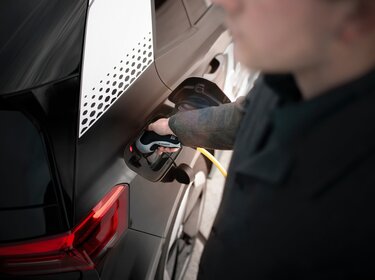EVs with mixed results at periodic technical inspections
Road
Periodical technical inspection

Following approval, road vehicles must undergo regular roadworthiness testing and operational safety checks. The purpose of the periodical technical inspection is to ensure that road vehicles remain roadworthy and safe, and do not pose a danger to drivers or other road users. The person using the vehicle affording the necessary power of disposal is responsible for the vehicle’s roadworthiness. The TÜV organisations’ technical inspection centres and officially recognised monitoring organisations are obliged to test the compliance of motor vehicles with certain legal requirements, for example relating to safety and environmental protection as well as upgrades.
Pursuant to Annex VIIIb to §29 of the German road traffic licensing regulations (Straßenverkehrs-Zulassungs-Ordnung, StVZO), monitoring organisations must provide the German accreditation body (Deutsche Akkreditierungsstelle, DAkkS) with proof of a quality management system conforming with ISO/IEC 17020 as confirmation of their competence to carry out the periodical technical inspection. This proof is the prerequisite for the recognition of a TÜV organisation as a monitoring organisation for carrying out the periodical technical inspection by the highest recognition authorities of the federal states. Supervision of the technical inspection bodies is the responsibility of the competent authorities of Germany’s 16 federal states.
In 2006, the exhaust emissions test originally conducted separately was integrated into the periodical technical inspection, becoming a “supplementary test”. The regular exhaust emissions tests for motor vehicles are an essential part of the periodical technical inspection and an important instrument for monitoring the orderly maintenance condition and function of motor vehicles’ handling of exhaust gases.
The inspection intervals vary and are based on Appendix VIII to §29 StVZO. Passenger vehicles must undergo their first periodical technical inspection three years after initial registration, for example. The inspection interval is then every two years. Buses must be inspected every year following their initial registration.
The older a vehicle is, the more frequently the officially recognised experts or TÜV inspectors find safety-relevant defects, hence one third of cars that are ten or more years old initially fail the periodical technical inspection. If the TÜV experts find significant defects, the sticker is only issued after each of these defects has been rectified. However, there are also vehicles that are decommissioned with immediate effect as they are deemed not roadworthy. They make up just 0.1 percent of vehicles though.
The technological advances and growing digitalisation of motor vehicles are leading to new challenges. It must also be possible to test advanced driver assistance systems and to check their functionality and impact as part of the periodical technical inspection. Motor vehicles are also connected to the internet via appropriate interfaces. Similar to today’s IT systems, the security of motor vehicles and fleets will in future also need to be monitored actively and continuously. For regardless how high the level of protection against cyberattacks was when a vehicle was first registered, this will inevitably decrease over its lifetime.
The foundations for further development of the corresponding test regulations are currently being created. The TÜV Association and its members are involved in discussions with the relevant regulatory and political bodies on the German and European levels.
Do you have any questions?
![Richard Goebelt [Translate to Englisch:]](/fileadmin/_processed_/a/b/csm_TUEV-Verband_Richard_Goebelt__C__Tobias_Koch__5__1800_px_c6d99ce0b2.jpg)
Richard Goebelt
Director of Automotive and Mobility, Member of the Management Board




